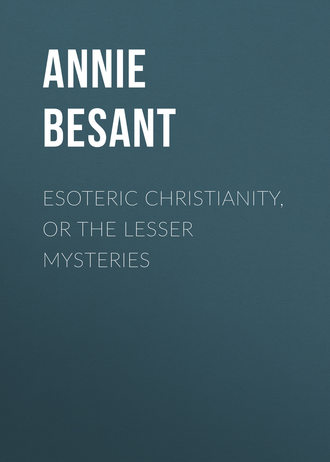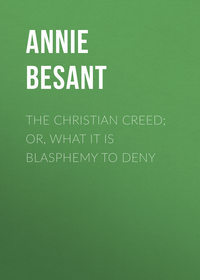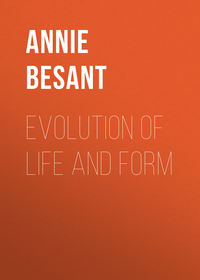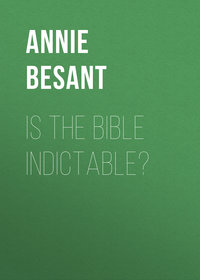 полная версия
полная версияEsoteric Christianity, or The Lesser Mysteries
That remembrance of true inspiration, that reality of the hidden life, has been put into beautiful and true words by Frederick Myers, in his well-known poem, S. Paul. The apostle is speaking of his own experience, and is trying to give articulate expression to that which he remembers; he is figured as unable to thoroughly reproduce his knowledge, although he knows and his certainty does not waver:
So, even I, athirst for His inspiring,I, who have talked with Him, forget again;Yes, many days with sobs and with desiring,Offer to God a patience and a pain.Then through the mid complaint of my confession,Then through the pang and passion of my prayer,Leaps with a start the shock of His possession,Thrills me and touches, and the Lord is there.Lo, if some pen should write upon your rafterMene and Mene in the folds of flame,Think ye could any memories thereafterWholly retrace the couplet as it came?Lo, if some strange intelligible thunderSang to the earth the secret of a star,Scarce should ye catch, for terror and for wonder,Shreds of the story that was pealed so far!Scarcely I catch the words of His revealing,Hardly I hear Him, dimly understand.Only the power that is within me pealingLives on my lips, and beckons to my hand.Whoso hath felt the Spirit of the HighestCannot confound, nor doubt Him, nor deny;Yea, with one voice, O world, though thou deniest,Stand thou on that side, for on this am I.Rather the world shall doubt when her retrievingPours in the rain and rushes from the sod;Rather than he in whom the great conceivingStirs in his soul to quicken into God.Nay, though thou then shouldst strike him from his glory,Blind and tormented, maddened and alone,E'en on the cross would he maintain his story,Yes, and in Hell would whisper, "I have known."Those who have in any sense realised that God is around them, in them, and in everything, will be able to understand how a place or an object may become "sacred" by a slight objectivisation of this perennial universal Presence, so that those become able to sense Him who do not normally feel His omnipresence. This is generally effected by some highly advanced man, in whom the inner Divinity is largely unfolded, and whose subtle bodies are therefore responsive to the subtler vibrations of consciousness. Through such a man, or by such a man, spiritual energies may be poured forth, and these will unite themselves with his pure vital magnetism. He can then pour them forth on any object, and its ether and bodies of subtler matter will become attuned to his vibrations, as before explained, and further, the Divinity within it can more easily manifest. Such an object becomes "magnetised," and, if this be strongly done, the object will itself become a magnetic centre, capable in turn of magnetising those who approach it. Thus a body electrified by an electric machine will affect other bodies near which it may be placed.
An object thus rendered "sacred" is a very useful adjunct to prayer and meditation. The subtle bodies of the worshipper are attuned to its high vibrations, and he finds himself quieted, soothed, pacified, without effort on his own part. He is thrown into a condition in which prayer and meditation are easy and fruitful instead of difficult and barren, and an irksome exercise becomes insensibly delightful. If the object be a representation of some sacred Person – a Crucifix, a Madonna and Child, an Angel, a Saint – there is a yet further gain. The Being represented, if his magnetism has been thrown into the image by the appropriate Word and Sign of Power, can re-inforce that magnetism with a very slight expenditure of spiritual energy, and may thus influence the devotee, or even show himself through the image, when otherwise he would not have done so. For in the spiritual world economy of forces is observed, and a small amount of energy will be expended where a larger would be withheld.
An application of these same occult laws may be made to explain the use of all consecrated objects – relics, amulets, &c. They are all magnetised objects, more or less powerful, or useless, according to the knowledge, purity, and spirituality of the person who magnetises them.
Places may similarly be made sacred, by the living in them of saints, whose pure magnetism, radiating from them, attunes the whole atmosphere to peace-giving vibrations. Sometimes holy men, or Beings from the higher worlds, will directly magnetise a certain place, as in the case mentioned in the Fourth Gospel, where an Angel came at a certain season and touched the water, giving it healing qualities.355 In such places even careless worldly men will sometimes feel the blessed influence, and will be temporarily softened and inclined toward higher things. The divine Life in each man is ever trying to subdue the form, and mould it into an expression of itself; and it is easy to see how that Life will be aided by the form being thrown into vibrations sympathetic with those of a more highly evolved Being, its own efforts being reinforced by a stronger power. The outer recognition of this effect is a sense of quiet, calm, and peace; the mind loses its restlessness, the heart its anxiety. Any one who observes himself will find that some places are more conducive to calm, to meditation, to religious thought, to worship, than others. In a room, a building, where there has been a great deal of worldly thought, of frivolous conversation, of mere rush of ordinary worldly life, it is far harder to quiet the mind and to concentrate the thought, than in a place where religious thought has been carried on year after year, century after century; there the mind becomes calm and tranquillised insensibly, and that which would have demanded serious effort in the first place is done without effort in the second.
This is the rationale of places of pilgrimage, of temporary retreats into seclusion; the man turns inward to seek the God within him, and is aided by the atmosphere created by thousands of others, who before him have sought the same in the same place. For in such a place there is not only the magnetisation produced by a single saint, or by the visit of some great Being of the invisible world; each person, who visits the spot with a heart full of reverence and devotion, and is attuned to its vibrations, reinforces those vibrations with his own life, and leaves the spot better than it was when he came to it. Magnetic energy slowly disperses, and a sacred object or place becomes gradually demagnetised if put aside or deserted. It becomes more magnetised as it is used or frequented. But the presence of the ignorant scoffer injures such objects and places, by setting up antagonistic vibrations which weaken those already existing there. As a wave of sound may be met by another which extinguishes it, and the result is silence, so do the vibrations of the scoffing thought weaken or extinguish the vibrations of the reverent and loving one. The effect produced will, of course, vary with the relative strengths of the vibrations, but the mischievous one cannot be without result, for the laws of vibration are the same in the higher worlds as in the physical, and thought vibrations are the expression of real energies.
The reason and the effect of the consecration of churches, chapels, cemeteries, will now be apparent. The act of consecration is not the mere public setting aside of a place for a particular purpose; it is the magnetisation of the place for the benefit of all those who frequent it. For the visible and the invisible worlds are inter-related, interwoven, each with each, and those can best serve the visible by whom the energies of the invisible can be wielded.
AFTERWORD
We have reached the end of a small book on a great subject, and have only lifted a corner of the Veil that hides the Virgin of Eternal Truth from the careless eyes of men. The hem of her garment only has been seen, heavy with gold, richly dight with pearls. Yet even this, as it waves slowly, breathes out celestial fragrances – the sandal and rose-attar of fairer worlds than ours. What should be the unimaginable glory, if the Veil were lifted, and we saw the splendour of the Face of the divine Mother, and in Her arms the Child who is the very Truth? Before that Child the Seraphim ever veil their faces; who then of mortal birth may look on Him and live?
Yet since in man abides His very Self, who shall forbid him to pass within the Veil, and to see with "open face the glory of the Lord"? From the Cave to highest Heaven; such was the pathway of the Word made Flesh, and known as the Way of the Cross. Those who share the manhood share also the Divinity, and may tread where He has trodden. "What Thou art, That am I."
Peace to all Beings1
S. Mark xvi. 15.
2
S. Matt vii. 6.
3
Clarke's Ante-Nicene Christian Library, Vol. IV. Clement of Alexandria. Stromata, bk. I., ch. xii.
4
I. Cor. iii. 16.
5
Ibid., ii. 14, 16.
6
S. John, i. 9.
7
Psalms, xlii. 1.
8
1 Cor. xv. 28.
9
Ante-Nicene Library, Vol. XII. Clement of Alexandria. Stromata, bk. V., ch. xi.
10
See Article on "Mysteries," Encyc. Britannica ninth edition.
11
Psellus, quoted in Iamblichus on the Mysteries. T. Taylor, p. 343, note on p. 23, second edition.
12
Iamblichus, as ante, p. 301.
13
Ibid., p. 72.
14
The article on "Mysticism" in the Encyclopædia Britannica has the following on the teaching of Plotinus (204-206 A.D.): "The One [the Supreme God spoken of above] is exalted above the nous and the 'ideas'; it transcends existence altogether and is not cognisable by reason. Remaining itself in repose, it rays out, as it were, from its own fulness, an image of itself, which is called nous, and which constitutes the system of ideas of the intelligible world. The soul is in turn the image or product of the nous, and the soul by its motion begets corporeal matter. The soul thus faces two ways – towards the nous, from which it springs, and towards the material life, which is its own product. Ethical endeavour consists in the repudiation of the sensible; material existence is itself estrangement from God… To reach the ultimate goal, thought itself must be left behind; for thought is a form of motion, and the desire of the soul is for the motionless rest which belongs to the One. The union with transcendent deity is not so much knowledge or vision as ecstasy, coalescence, contact." Neo-Platonism is thus "first of all a system of complete rationalism; it is assumed, in other words, that reason is capable of mapping out the whole system of things. But, inasmuch as a God is affirmed beyond reason, the mysticism becomes in a sense the necessary complement of the would-be all-embracing rationalism. The system culminates in a mystical act."
15
Iamblichus, as ante, p. 73.
16
Ibid, pp. 55, 56.
17
Ibid, pp. 118, 119.
18
Ibid, p. 118, 119.
19
Ibid, pp. 95, 100.
20
Ibid, p. 101.
21
Ibid, p. 330.
22
G. R. S. Mead. Plotinus, p. 42.
23
Iamblichus, p. 364, note on p. 134.
24
G. R. S. Mead. Orpheus, pp. 285, 286.
25
Iamblichus, p. 364, note on p. 134.
26
Iamblichus, p. 285, et seq.
27
G. R. S. Mead. Orpheus, p. 59.
28
Ibid, p. 30.
29
Ibid, pp. 263, 271.
30
G. R. S. Mead. Plotinus, p. 20.
31
Shvetâshvataropaniṣhat, vi., 22.
32
Kaṭhopaniṣṣhat, iii., 14.
33
I. Cor. xiii. 1.
34
Kaṭhopaniṣhat, vi. 17.
35
Muṇdakopaniṣhat, II., ii. 9.
36
Ibid., III., i. 3.
37
I Sam. xix. 20.
38
II. Kings ii. 2, 5.
39
Under "School."
40
Dr. Wynn Westcott. Sepher Yetzirah, p. 9.
41
S. Mark iv. 10, 11, 33, 34. See also S. Matt. xiii. 11, 34, 36, and S. Luke viii. 10.
42
S. John xvi. 12.
43
Acts i. 3.
44
Loc. cit. Trans. by G. R. S. Mead. I. i. 1.
45
S. Matt. vii. 6.
46
As to the Greek woman: "It is not meet to take the children's bread, and to cast it unto the dogs." – S. Mark vii. 27.
47
S. Luke xiii. 23, 24.
48
S. Matt. vii. 13, 14.
49
Kaṭhopaniṣhat II. iv. 10, 11.
50
Brihadâraṇyakopaniṣhat. IV. iv. 7.
51
Rev. vii. 9.
52
Bahgavad Gîtâ, vii. 3.
53
Ante, p. 26.
54
It must be remembered that the Jews believed that all imperfect souls returned to live again on earth.
55
S. Matt. xix. 16-26.
56
S. John xvii. 3.
57
Heb. ix. 23.
58
S. John. iii. 3, 5.
59
S. Matt. iii. 11.
60
Ibid. xviii. 3.
61
S. John iii. 10.
62
S. Matt. v. 48.
63
Ante, p.24
64
Note how this chimes in with the promise of Jesus in S. John xvi. 12-14: "I have yet many things to say unto you, but ye cannot bear them now. Howbeit when He, the Spirit of Truth, is come, He will guide you into all truth… He will show you things to come… He shall receive of mine, and shall show it unto you."
65
Another technical name in the Mysteries.
66
Eph. iii. 3, 4, 9.
67
Col i. 23, 25-28. But S. Clement, in his Stromata, translates "every man," as "the whole man." See Bk. V., ch. x.
68
Col. iv. 3.
69
Ante-Nicene Library, Vol. XII. Clement of Alexandria. Stromata, bk. V. ch. x. Some additional sayings of the Apostles will be found in the quotations from Clement, showing what meaning they bore in the minds of those who succeeded the apostles, and were living in the same atmosphere of thought.
70
I. Tim. iii. 9, 16.
71
I. Tim. i. 18.
72
Ibid., iv. 14.
73
Ibid., vi. 13.
74
Ibid., 20.
75
II. Tim. i. 13, 14.
76
Ibid., ii. 2.
77
Phil. iii. 8, 10-12, 14, 15.
78
Rev. i. 18. "I am He that liveth, and was dead; and behold, I am alive for evermore. Amen."
79
II. Cor. v. 16.
80
Gal. iii. 27.
81
Gal. iv. 19.
82
I. Cor. iv. 15.
83
I. S. Pet. iii. 4.
84
Eph. iv. 13.
85
Col. i. 24.
86
II. Cor. iv. 10.
87
Gal. ii. 20.
88
II. Tim. iv. 6, 8.
89
Rev. iii. 12.
90
Gal. iv. 22-31.
91
I Cor. x. 1-4.
92
Eph. v. 23-32.
93
Vol. I. The Martyrdom of Ignatius, ch. iii. The translations used are those of Clarke's Ante-Nicene Library, a most useful compendium of Christian antiquity. The number of the volume which stands first in the references is the number of the volume in that Series.
94
Ibid. The Epistle of Polycarp, ch. xii.
95
Ibid. The Epistle of Barnabas, ch. i.
96
Ibid. ch. x.
97
Ibid. The Martyrdom of Ignatius, ch. i.
98
Ibid. Epistle of Ignatius to the Ephesians, ch. iii.
99
Ibid. ch. xii.
100
Ibid. to the Trallians, ch. v.
101
Ibid. to the Philadelphians, ch. ix.
102
Vol. IV. Clement of Alexandria Stromata, bk. I. ch. i.
103
Vol. IV. Stromata, bk. I. ch. xxviii.
104
It appears that even in those days there were some who objected to any truth being taught secretly!
105
Ibid. bk. I, ch. i.
106
Ibid. bk. V., ch. iv.
107
Ibid. ch. v. – viii.
108
Ibid. ch. ix.
109
Ibid. bk. V., ch. x.
110
Loc. Cit. xv. 29.
111
Ibid. xvi. 25, 26; the version quoted differs in words, but not in meaning, from the English Authorised Version.
112
Stromata, bk. V., ch. x.
113
Ibid. bk. VI., ch. vii.
114
Ibid. bk. VII., ch. xiv.
115
Ibid. bk. VI., ch. xv.
116
Ibid. bk. VI. x.
117
Ibid. bk. VI. vii.
118
Ibid. bk. I. ch. vi.
119
Ibid. ch. ix.
120
Ibid. bk. VI. ch. x.
121
Ibid. bk. I. ch. xiii.
122
Vol XII. Stromata, bk. V. ch. iv.
123
Ibid. bk. VI. ch. xv.
124
Book I. of Against Celsus is found in Vol. X. of the Ante-Nicene Library. The remaining books are in Vol. XXIII.
125
Vol. X. Origen against Celsus, bk. I. ch. vii.
126
Ibid.
127
Ex. xxv. 40, xxvi. 30, and compare with Heb. viii. 5, and ix. 25.
128
Origen against Celsus, bk. IV. ch. xvi.
129
Ibid. bk. III. ch. lix.
130
Ibid. ch. lxi.
131
Ibid. ch. lxii.
132
Ibid., ch. lx.
133
Vol. XXIII. Origen against Celsus, bk. V. ch. xxv.
134
Ibid. ch. xxviii.
135
Ibid. ch. xxix.
136
Ibid. ch. xx xi.
137
Ibid. ch. xxxii.
138
Ibid. ch. xlv.
139
Ibid. ch. xlvi.
140
Ibid. chs. xlvii. – liv.
141
Ibid. ch. lxxiv.
142
Ibid. bk. IV., ch. xxxix.
143
Vol. X. Origen against Celsus, bk. I., ch. xvii, and others.
144
Ibid. ch. xlii.
145
Vol. X. De Principiis, Preface, p. 8.
146
Ibid. ch. i.
147
S. John xiv. 18-20.
148
Loc. cit. ch. i. sec. III. p. 55.
149
Ibid. ch. I. Sec. III. pp. 55, 56.
150
Ibid. pp. 54, 55.
151
"Seems to have been" is a somewhat weak expression, after what is said by Clement and Origen, of which some specimens are given in the text.
152
Ibid., p. 62.
153
Article on "Mysticism." —Encyc. Britan.
154
Article "Mysticism." Encyclopædia Britannica.
155
Orpheus, pp. 53, 54.
156
Obligation must be here acknowledged to the Article "Mysticism," in the Encyc. Brit., though that publication is by no means responsible for the opinions expressed.
157
The Mysteries of Magic. Trans. by A. E. Waite, pp. 58 and 60.
158
II. S. Peter i. 5.
159
Gal. iv. 19.
160
II. Cor. v. 16.
161
S. John i. 14.
162
S. John i. 32.
163
S. Matt. iii. 17.
164
Ibid. iv. 17.
165
I. Tim. iii. 16.
166
S. John x. 34-36.
167
S. John xiv. 18, 19.
168
Valentinus. Trans. by G. R. S. Mead. Pistis Sophia, bk. i., I.
169
Ante, p. 72.
170
Ibid. 60.
171
Ibid. bk. ii., 218.
172
Ibid. 230.
173
Ibid. 357.
174
Ibid. 377.
175
Vol. II. Justin Martyr. First Apology, §§ liv., lxii., and lxvi.
176
Vol. II. Justin Martyr. Second Apology, § xiii.






